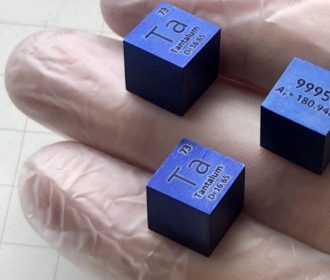Introduction:
Tantalum, a rare and highly valued metal, finds its application in various industries due to its exceptional properties. One notable compound derived from tantalum is Tantalum Sulfate. In this article, we will explore the important aspects of Tantalum Sulfate, its properties, applications, and its significance in different fields.

Understanding Tantalum Sulfate:
Tantalum Sulfate is a compound formed by the combination of tantalum and sulfur. It is commonly found in the form of a white crystalline powder. With its chemical formula Ta2(SO4)5, it showcases unique properties that make it desirable for numerous applications.
Properties of Tantalum Sulfate:
Tantalum Sulfate exhibits several noteworthy properties that contribute to its wide range of applications. These properties include:
High melting point: Tantalum Sulfate possesses a high melting point, allowing it to withstand extreme temperatures.
Chemical stability: It demonstrates excellent chemical stability, resisting corrosion from acids and other harsh chemicals.
Solubility: Tantalum Sulfate is soluble in water, enabling its use in various solutions and electrolytes.
Conductivity: It exhibits good electrical conductivity, making it suitable for certain electronic applications.
Catalytic properties: Tantalum Sulfate can act as a catalyst in certain chemical reactions, facilitating the desired transformations.
Applications of Tantalum Sulfate:
Tantalum Sulfate finds diverse applications across different industries:
Electronics: Due to its excellent electrical conductivity and chemical stability, Tantalum Sulfate is used in the production of tantalum capacitors, which are crucial components in electronic devices like smartphones, computers, and automotive electronics.
Chemical Industry: Tantalum Sulfate serves as a catalyst in various chemical reactions, including organic synthesis and petroleum refining.
Energy Storage: Tantalum Sulfate is employed in advanced energy storage systems such as supercapacitors, where it is high surface area and electrical conductivity enhance energy storage and discharge capabilities.
Biomedical: The biocompatibility and chemical stability of Tantalum Sulfate make it suitable for certain medical applications such as implants and biomedical coatings.
Significance in Research and Development:
Tantalum Sulfate plays a vital role in research and development efforts. Its unique properties enable scientists and researchers to explore new avenues in energy storage, catalysis, and electronic applications. Additionally, its use in biomedical applications contributes to advancements in healthcare technology.
Sustainable and Responsible Mining:
It is important to note that tantalum, including its derivatives like Tantalum Sulfate, is primarily obtained from tantalite ores, which are found in specific regions globally. Responsible mining practices and initiatives ensure that tantalum extraction respects environmental regulations and social welfare.
Conclusion:
Tantalum Sulfate, derived from the rare metal tantalum, exhibits exceptional properties that make it valuable in a wide range of applications. From electronics to energy storage and catalysis, its contributions are evident in various industries. As research and development continue to uncover new possibilities, the significance of Tantalum Sulfate in advancing technology and improving lives will only grow further.




Recent Comments